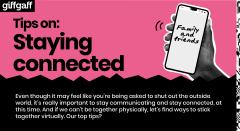Categories
Managing Financial Anxiety
7 minute read
Hi giffgaff members. I’m Jon Barnes and I was invited by giffgaff to write about our relationship with money particularly related to our mental health during the pandemic. In this article, I’ll share my personal financial difficulties and the tools I use to suffer less in hard times.
One thing I’m acutely aware of when speaking to various friends, family and colleagues at the moment is that we are all living very personal versions of this crisis. Last week I had a call with a colleague who said that their biggest struggle has been for them and their partner to balance both working with parenting three children. A moment alone sounded like it would be bliss for them. A few hours later I spoke to another colleague whose biggest struggle has been the loneliness that has come from living alone during lockdown. It’s like we’re living in alternate realities. I guess we always are, that’s just amplified right now. My alternate reality is that I’m lucky to have my health intact and that my family and friends have remained healthy too. For me, this crisis hasn’t been about health, but rather it’s been a financial crisis.
A personal financial crisis
Truth is the last couple of years have been a little rough financially but with the pandemic, my regular earnings have now officially dropped to £0. Being a ‘director’ of a tiny limited company, the government support I get as of the end of this month will be £500 per month. Being the sole earner in my family (I live with my wife and our son, who’s 9 years old), this isn’t ideal to say the least. I’ve now received an extra credit card I ordered a couple of weeks ago. But what’s really strange is that… well… I feel… Ok.
Over the course of the past few years, I’ve started applying several thinking tools to my relationship with money. It’s really helped me take the sting out of the psychological impact of what has for me been a financial crisis. It’s also changed the place money holds in my day to day life. I thought I’d share some of these thinking tools here in the hope that they help anybody reading who might be in the same situation. Let me emphasise that what you’re about to read will not earn you any money whatsoever, but could help you to suffer less psychologically from any current difficulties you’re having with money.
4 tools for managing financial anxiety
1.Both ‘Take control’ and ‘Let go of control’
Learning to triage our concerns into things we can control and things we can’t control is a really useful way to decide where to spend our energy. For instance, I clearly have no control over a global pandemic, so there is no point spending any energy at all trying to solve that one. So that goes into the ‘Let go’ pile. I also have very little power over my clients losing their clients. So I’ll let go of that one too. After letting go and letting go, things start to feel strangely peaceful. But that doesn’t mean all is sorted. I do have control over applying for a government furlough scheme. So I’ll ‘take control’ of that one. I am able to reach out to colleagues in case they need my services. That can go in the ‘take control’ pile. Knowing what you can and can’t do about any given problem is very valuable. And one thing we can always take control over is our mental reaction to events.
2.Being mindful of our mental reactions
I’m aware that the incessant media talk of mindfulness is becoming a bit nauseating but give me a chance here. Over the past 5 years, I’ve meditated for close to 1,000 hours. I’ve been on two 10-day silent retreats, meditating for 10hrs per day. And the basic lesson I’ve gained from sitting down far too much, is that our minds shape our whole experience of the world. The good news is that we can have far more control over that than we think.
There is a saying in meditation that goes something like “I try to meditate 30 minutes per day except for if I’m busy, then I try to meditate 1hr per day”. This has certainly been the case for me these past couple of months and it’s been hugely valuable. But formerly sitting down or not, the real aim of the project is to learn to notice our mental and emotional reactions to life’s events and observe them with enough objectivity that they lose their grip on us. Rather than only obsessing over the money, we can pay attention to the emotions that it triggers. In that sense, this can be reframed as an opportunity to grow and become more resilient.
3. Gratitude and looking for silver linings
Every night, we sit around the dinner table and take it in turns to tell each other what we’re grateful for from the day gone by. The goal is to shine a light on what is working right now. A few times in the last couple of weeks, I’ve come up blank. But then, when I’d think a bit more I’d find myself saying ‘Well actually, that coffee I made this morning was glorious. And actually, I might be annoyed that work is very slow, but I spend the rest of my life wishing the world would slow down a bit, so that’s been quite nice. I mustn’t waste that wonderful opportunity. I’m also grateful to be healthy.’
This can sometimes be confused with an optimism-bias, where we ignore the tough reality of life or the suffering that others are going through, but this is not the goal at all. The goal is simply to say, ‘Yes, a lot of stuff sucks right now and I will do what I can to improve this. But I also choose my reactions to life’s events. And I’m choosing to be happy and positive in the face of adversity.’ On close inspection we all have so much to be grateful for. And it’s worth training our brains to think that way.
4.What needs do you use money to resolve?
One tool I’ve found very useful is to ask myself this question “What needs do you use money to resolve right now?” and then I put these needs into three categories:
- Functional needs
- Emotional needs
- Social needs
For instance, I use money to resolve my functional need of getting food and paying our bills. This seems like a pretty straightforward and acceptable use of money. But in the past I’ve also (rather embarrassingly) used money to fulfill my social need of appearing successful and important in the eyes of others. Or to resolve my emotional need to feel like I’m worth something in the world. These two are slightly more suspect. Money in these two instances is a very ineffective strategy to get my needs met. To fulfill my need to feel like I’m worth something, I can simply choose to believe I’m worth something. I can also work on getting better at accepting compliments from others. On some level we all use money to fulfill these psychological needs and I suggest that it’s worth keeping a check on that. It could be that we can have many of our needs met in far more straightforward and rewarding ways.
The tools I’ve listed above are just a few of the many tools that we can apply to managing our mental health not just when it comes to money, but life in general. This isn’t to downplay the very real challenges many people are facing. We must address these in pragmatic ways. But it is also a stark realisation to see that whilst there is certainly very real harm all around us in the world, much of our hardship is the result of the chatter in our own minds. Learning to make that inner conversation healthier can help us to navigate tough times and be even more effective in overcoming them.
~
I hope you enjoyed the read. If you have any question or if would like to know more about the work I do, please visit my website http://jonbarnes.me





